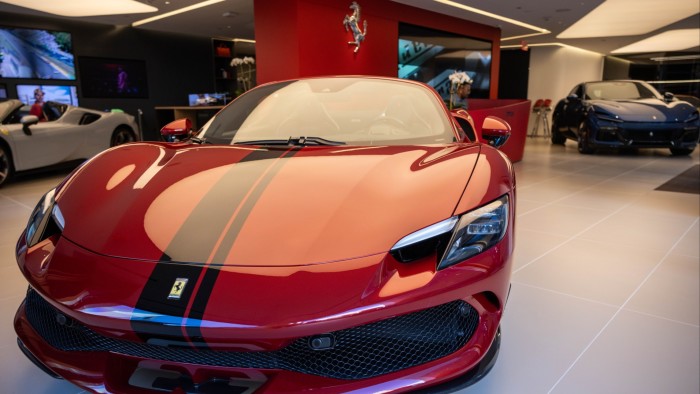Unlock the Editor’s Digest for free
Roula Khalaf, Editor of the FT, selects her favourite stories in this weekly newsletter.
Demand for Ferrari’s supercars in the US remains “hot” despite price increases to offset Donald Trump’s tariffs, according to its chief executive, as the company maintained its guidance for profit growth this year.
The Italian group is exposed to Trump’s 25 per cent tariffs on imports of foreign-made cars since it makes all of its cars in Italy, even though the US is its largest market and is where it sells about one in four cars. But the luxury-car maker also has enough brand strength to pass on the tariff costs to consumers.
The company on Tuesday said it had not received cancellations in its order book — which already covers the whole of 2026 — even after it announced plans in March to raise prices for some of its models by up to 10 per cent.
“Today, we don’t see any weakening of the order book,” said chief executive Benedetto Vigna. “When it comes to the tariff, specifically, I think the order book and the portfolio we have allow us to navigate with better visibility.”
Ferrari reported a 23 per cent year-on-year increase in operating profit to €542mn during the first quarter while revenue increased 13 per cent to €1.79bn. Both metrics, which exceeded market expectations, reflected continuing demand for personalisation, with buyers adding expensive features to their supercars.
While many other carmakers have withdrawn or sharply reduced their guidance over the past week, Ferrari broadly stuck with its previous forecast for an adjusted operating profit of at least €2bn and a profit margin of at least 29 per cent.
It cautioned that the guidance faced a potential risk of a 50 basis point reduction on profitability percentage margins.
“Ferrari stands out, reporting consensus-beating first-quarter results and confidently reiterating its fiscal 2025 guidance,” Bernstein analysts wrote, describing the outcome as “rock steady”.
The company has managed to generate higher margins even as shipments only increased 1 per cent from a year earlier to 3,593 vehicles. The group delivered five hybrid models in the first quarter, representing 49 per cent of total shipments.
Shipments to China, Hong Kong and Taiwan fell 25 per cent during the first three months of the year as luxury car brands continue to grapple with slowing demand in China.
But China represents a relatively small market for Ferrari because the carmaker sets a cap of 10 per cent on deliveries to the country.
Vigna said on Tuesday that the company was also on track to unveil its first electric vehicle in October, with sales due to start a year later in 2026.


